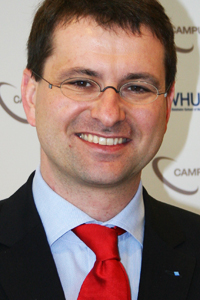The financial crisis has taken center stage in business school classrooms around the world. Rightfully so, says the finance chair at one of Germany’s leading business schools.
How is the financial crisis affecting the way you teach finance?
One positive thing about the things that are going on right now is that we can learn a lot from them. You can empirically analyze how markets react in extreme scenarios. This is something you find in our lectures. Our lectures are focused on recent developments anyway, but this year we are teaching a lot about the financial crisis.
Of course, we also have conferences where we invite academics, as well as professionals. One example was the Campus for Finance New Year Conference recently where we had a lot of CFOs and CEOs here, one Nobel laureate, and a lot of professors. We were talking for three entire days about the financial crisis – what the reasons for it are and what can be improved in the future in order to avoid these developments that we have right now.




